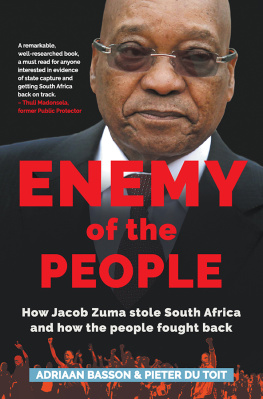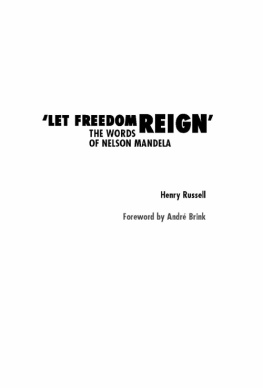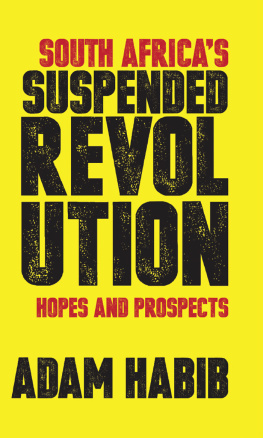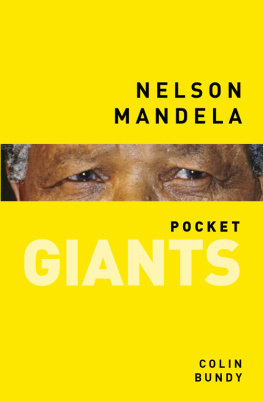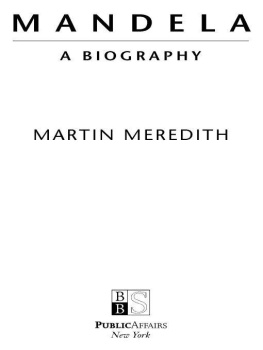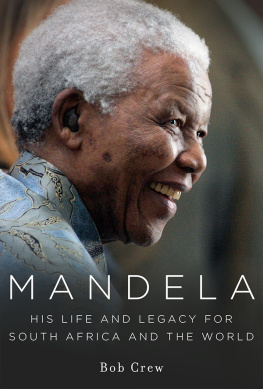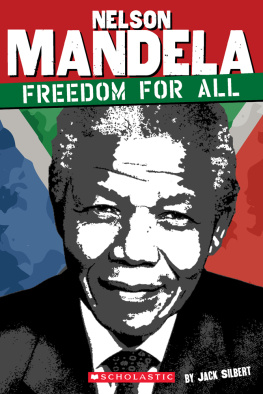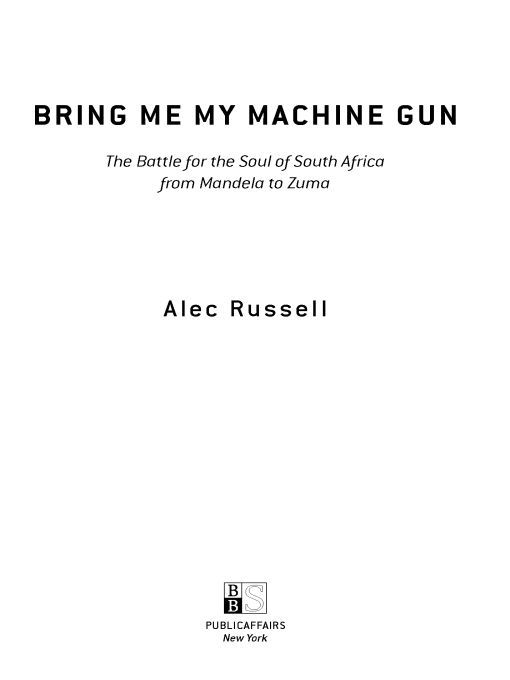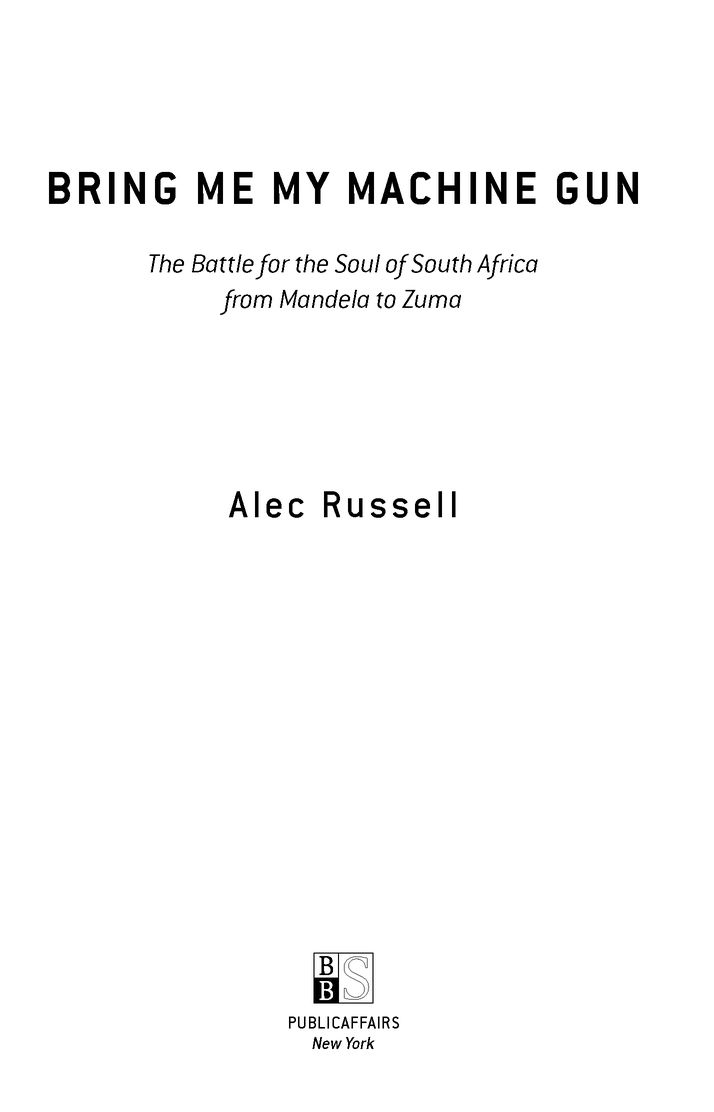Table of Contents
To Sophie, Mungo, and Ned, with my undying love.
CHRONOLOGY
| 1652 | First Dutch settlement founded at the Cape by Jan van Riebeeck |
| 1836 | Start of the Great Trek by Afrikaners from the Cape |
| 1886 | Discovery of gold on Witwatersrand |
| 1899-1902 | Anglo-Boer War |
| 1910 | Union of South Africa founded with the merging of the Boer Republics of the Orange Free State and the Transvaal and the British colonies of the Cape and Natal |
| 1912 | Foundation of the African National Congress in Bloemfontein |
| 1913 | Native Land Act restricts blacks to reservations, depriving millions of their birthright |
| 1918 | Nelson Mandela born in the Eastern Cape |
| 1948 | National Party comes to power on platform of separating races |
| 1955 | Congress of the People adopts the Freedom Charter |
| 1959 | Pan-Africanist Congress (PAC) breaks away from ANC |
| 1960 | Sharpeville Massacre: 69 protesters killed by police; ANC and PAC banned |
| 1962 | Nelson Mandela arrested |
| 1964 | Nelson Mandela and other ANC leaders sentenced to life imprisonment |
| 1976 | Soweto student uprising |
| 1977 | Steve Biko dies in police custody |
| 1989 | F. W. de Klerk takes over leadership of National Party |
| 1990 | F. W. de Klerk unbans the ANC and PAC and releases Mandela from prison |
| 1994 | First democratic election; inauguration of Mandela as president |
| 1999 | Thabo Mbeki inaugurated as president after ANC wins increased majority |
| 2004 | Mbeki wins second term with even larger majority for ANC |
| 2005 | Jacob Zuma fired as deputy president and charged with corruption |
| 2006 | Jacob Zuma acquitted of charge of raping the daughter of a family friend; corruption case thrown out of court on a technicality |
| 2007 | Zuma defeats Mbeki in election for leadership of the ANC; Zuma charged again with corruption, fraud, racketeering, money laundering, and tax evasion |
| 2008 | ANC deposes Mbeki as national president after a judge throws out Zumas corruption case on a technicality; Kgalema Motlanthe is appointed as caretaker president; ANC breakaway movement, the Congress of the People (COPE), founded in Bloemfontein, birthplace of the ANC |
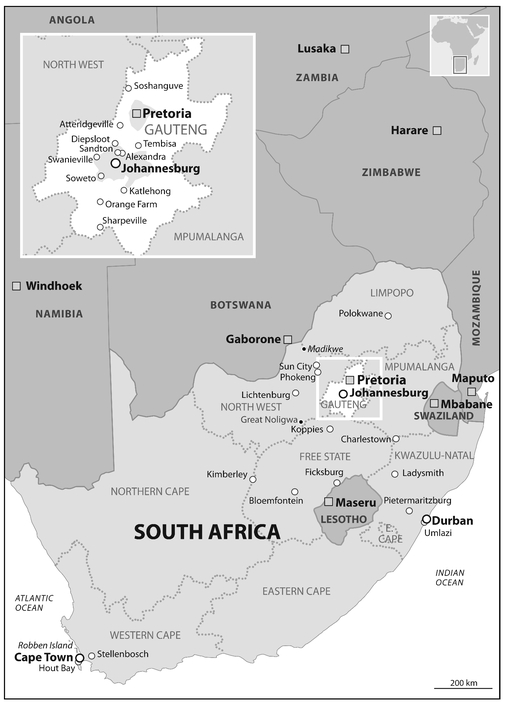
INTRODUCTION: THE NEW STRUGGLE
There is no shortcut to the country of our dreams.
NELSON MANDELA,
ON THE FIRST ANNIVERSARY OF THE FIRST ALL-RACE ELECTIONS
The history of countries throwing off tyrannical regimes tends to follow a pattern. In the immediate aftermath there is euphoria, accompanied by utopian pledges for the future. Then the new rulers find the business of governing more difficult and messier than they could ever have imagined. They also find that it is far harder to overcome their own past than they had appreciated as they plotted their takeover in prison or in exile. It is in this second stage that the true meaning and trajectory of a revolution unfolds.
In Eastern Europe after the fall of the Berlin Wall, the jubilation at the overthrow of communism soon gave way to distress at the hardship of the shift to free-market economics and to agonising over how to exorcise the past. Africa had yet harder experience in the second half of the twentieth century, when the continent celebrated as colonial flags were struck down, only to see the promise of the new era swiftly implode. The new states were betrayed by the colonizing powers, which had equipped them with only a handful of graduates to run their governments. They were betrayed by Moscow and Washington, who used them as proxy battlefields of the Cold War. Most of all they were betrayed by their own leaders, many of whom did little but bask in personality cults and fill foreign bank accounts while beggaring their people. These new states inherited a complex set of challenges, not least how to take a largely undeveloped society into the modern world. The task would have challenged any new political cast, however brilliant. South Africa, the continents unofficial superpower, is no different.
For a few years after the end of white rule in 1994, Nelson Mandelas visionary leadership encouraged the hazy belief that a political miracle had occurred and that a new South Africa had been born, exorcised of the torment of the past. For many years it had been widely assumed that South Africas fight for liberation from apartheid would end in a race war. Instead, the tall, dignified leader of the African National Congress emerged from twenty-seven years in prison preaching forgiveness. Together with the last white president, F. W. de Klerk, a more flawed but also brave leader, Mandela steered their troubled land to peace. South Africas negotiated transition from white rule to democracy was one of the wonders of the late twentieth century. But it was only the first chapter of the postliberation narrative.
The ANC made a steady start in tackling the legacy of white rule. It swiftly introduced a liberal constitution supported by independent courts that guaranteed rights long denied under apartheid. It revived the economy. It established South Africa as a presence on the world stage. But after fifteen years in power, the ANC is in danger of losing its way. It has catastrophically failed its two greatest challenges, AIDS and the collapse of Zimbabwe on its border. Now it is fighting to escape the shadow of so many other liberation movements that came to office with great dreams only to see them founder under the weight of unfulfillable expectations and against the backdrop of corruption, infighting, and misrule. South Africas second struggle is underway.

When I first came to South Africa in April 1993, the struggle against apartheid was reaching a dramatic climax. Mandela had been released from prison and the ANC unbanned three years earlier, but white extremists and Zulu irredentists threatened to secede and plunge the country into chaos. While the worst of the apartheid laws had been repealed, traveling across the country was still like stepping back in time. Outside the major cities the only black people in sight in the areas traditionally set aside for whites worked at gas stations and cafs or waited at the side of the road for transport home to their township. The presenters on state radio had the same homely tonesand fruity 1950s BBC intonationthat had comforted white South Africans through the long years of white rule. The news was unremittingly bleak: mediation talks between the ANC and the government were stalling; pylons had been blown up by right-wing extremists; the townships east of Johannesburg were engulfed in fighting. It all sounded depressingly familiar.
I had come to South Africa from Bosnia after eighteen months reporting on Yugoslavias descent into civil war. There I had learned to despair of the cynicism of politicians who whipped up ancient ethnic animosities for their own ends. There were grim parallels with the situation in South Africa. Just as shadowy paramilitaries stoked tensions in the Bosnian hinterland in the countdown to the war, death squads were at work in South Africa, running through early morning trains in the sprawling townships of Soweto randomly killing commuters and fomenting the fighting in the townships. Then, of course, there were the maps.


